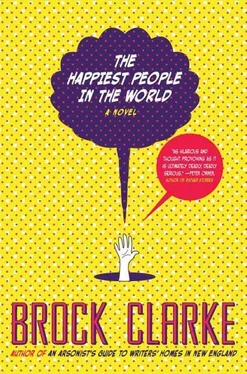“You know,” Locs said, “I don’t really care too much about either of those things.”
Mr. Korkmaz nodded. He raised the cup and shook some of the ice into his mouth. He crunched on it. Then he shook the rest of the ice into his mouth and crunched on that, too. “I have not been making the argument that the cartoonist deserved to die,” he said.
“Oh, he deserves to die all right,” Locs said. She’d pictured it many times over the years. She was picturing it now, too. Maybe Søren wasn’t dead. Maybe he really had managed to kill the cartoonist. Wouldn’t that be great? But wait: would that be great? If the cartoonist were dead, then Ellen couldn’t marry him. And if she couldn’t marry him, would she go back to Matthew? Would Matthew go back to her? Locs hadn’t thought of this. How had Locs managed to not think of any of this?
“I really hope Søren doesn’t kill that cartoonist,” she said to herself, but of course Mr. Korkmaz heard her. He placed his now empty cup on the tray and turned to her as fully as the tray and seat belt would permit.
“Do you have any children?” he asked.
“Yes,” she said. She said it so quickly that it felt like it really was true.
“A son?”
“His name is Kurt,” Locs said. “He’s sixteen years old.” And then she just kept talking: About how Kurt lived with his father in Broomeville, New York. The father’s name was Matthew. He and Locs had never gotten married. They’d had their share of troubles. They’d had their share of other people’s troubles. But all that was past them. She and Kurt and Matthew were all going to be together now. It was time. Mr. Korkmaz listened to this, nodding, nodding, as though he understood perfectly. When she was done, he said, “When was the last time you saw him?”
“Way too long.”
“You must have missed him.”
“I can’t even say,” Locs said. This was true. She felt that if she were to say more, she would start to cry. Matthew, I’ve missed you so much, Matthew. Although of course Mr. Korkmaz thought they were talking about Kurt, not Matthew.
“What would you do if someone tried to hurt him?”
“I would kill that person.”
Mr. Korkmaz nodded. “So you and I feel very much exactly the same way.” Just then the plane banked; the engine made some ominous shifting sounds. A ding sounded overhead, and the attendants began fast-walking their carts down the aisle, and Locs was absolutely certain that this was the first moment in what would be a series of moments that would conclude in each and every person on this airplane dying in a terrible crash. Locs turned to Mr. Korkmaz, and he was smiling. “I have been an imam,” he said.
“What’s that?”
“I have been an imam, but only to Søren.” And then Mr. Korkmaz told her how he’d pretended to be an Internet imam, how every Saturday night he’d gone to the Internet café and contacted Søren in that disguise, using that medium, just so that Søren would know that he wasn’t alone, just so Søren would have someone to talk to.
Why didn’t you just talk to him as yourself? Locs thought but did not say. Because she knew. Because everyone knows that there’s nothing more antagonizing to a son than a father who tries. “Did it work?” Locs asked.
“Not as of this moment,” Mr. Korkmaz said. He did not sound sad; he did not even sound resigned. There had even been a note of hope somewhere in his sentence. Locs thought she understood why. Sometimes the most difficult problems called for the most ridiculous solutions. And even then you weren’t sure they would work. But that did not mean you stopped trying. On the other hand, it might be that to stop trying would end up being the solution. And it also might be that Locs herself was the problem. But it was ridiculous for her to be thinking that. Why was she thinking that? Maybe it was the plane, which was now bouncing around as though some enormous being, some large meteorological presence with hands, was actually shaking it. She closed her eyes and the shaking got worse. She opened them and looked to Mr. Korkmaz for some more of his wonderful, calming influence. But he was putting up his tray and stuffing his cup in the seat-back pouch and straightening his seat and basically doing all the things that people who are worried on an airplane do when they’re trying not to act worried.
“Perhaps you’d better fasten your seat belt,” Mr. Korkmaz said to Locs. And those were his last words to her before they landed at JFK.
It was 2:55. Ellen and Matty were seated next to each other in the auditorium, third row, off to the right. Ellen was nervously drumming her fingers on the armrest; Matty had to resist the urge to cover her hand with his. Meanwhile the musicians were making their rude warming-up sounds. Kurt was with the rest of the trumpeters, in the second row, behind the flautists. Mr. Ferraro, that round-faced, black-Converse-All-Star-and-tuxedo-wearing ham, bowed low to the audience — students, parents, faculty, and staff — and then turned back to his musicians. Nobody really knows what conductors do, if anything, but it was still sweet to see how closely the kids paid attention to their leader. Kurt, too, was looking intently at the band director: Just tell me what to do, Kurt’s eyes said. Ferraro raised his baton, Kurt put his trumpet to his lips; Ferraro started moving his baton, Kurt and the other kids started blowing. In concerts past, Matty oftentimes did not recognize a song unless Ferraro said, after the song had been played, “That was. .” etc. But Matty recognized this one right away: it was The Who’s “My Generation,” that famous adolescent call to suicidal arms. Hey, Matty realized, the band was actually pretty good this year. And Kurt seemed particularly great. It is a truism that every father in the audience at a school band concert thinks he can distinguish his child’s trumpeting from the other children’s lesser trumpeting. But Matty really could tell. Kurt somehow had gotten really good. Matty looked at Ellen to see whether she was hearing what he was hearing. But she wasn’t looking at the band. She was scanning the audience, looking for someone, wondering where he was, why he wasn’t there. Matty knew who, of course; he didn’t see him, either. Good, he thought. Forget Henry. I’m here. Kurt is here. And he’s really good. Did you know he was really good? “When did Kurt get to be such a good trumpet player?” he whispered to her. When Matty whispered that, Ellen sort of snapped to, smiled at Matty, and then started looking toward the stage.
All day, all day, all day. For the second straight day, Henry had waited all day for something to happen: for the stranger to show up again; for Kurt to slip another menacing note under Henry’s door; for Ronald, Matty, Ellen, everyone, to figure out who he really was. None of that had happened. Now, 2:55. Time to go to Kurt’s band concert. A certain kind of insanity overtakes a person who makes it through what has promised to be a difficult day. He thinks, I knew something bad was going to happen to me. But nothing bad has happened to me yet. Maybe nothing bad will happen to me at all. Wouldn’t it be incredible if Kurt’s band concert was the worst thing that happened to me?
Henry got up from his chair, walked around his desk, and opened the door, and standing there was that odd security guard. Joseph, that was his first name. Henry didn’t know his last. They had barely spoken. Every time Henry happened to walk toward Joseph in the hall, Joseph ducked his head or bent down to tie his shoe or veered off in an entirely different direction, usually the one from which he’d just come. Odd. Henry thought Joseph looked familiar, too, but maybe that’s because we always think we recognize people who are trying to avoid us.
Читать дальше












